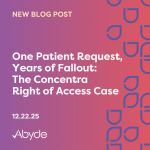July 28, 2025
Healthcare’s cybercrime nightmare just got more expensive. With over half a million dollars in fines and the second HIPAA ransomware fine issued this month alone, it’s time to acknowledge the serious threat cybercrimes pose to healthcare.
The Office for Civil Rights (OCR) just announced its latest HIPAA fine, following a ransomware attack affecting a surgery center in New York, totalling $250,000 and placing the practice under a two-year Corrective Action Plan (CAP). The two-year period includes constant government monitoring, ensuring the healthcare provider has taken action to mitigate risks and secure Protected Health Information (PHI).
Here’s where things get interesting. Upon further inspection, the exact ransomware variant, PYSA, explicitly targets the healthcare industry. Think about it: cybercriminals know the absolute treasure trove of sensitive patient data a healthcare organization holds.
As malicious actors know the importance of patient health records, your practice must be extra vigilant when handling PHI.
What Happened?
In March 2021, an unauthorized actor gained access to the networks of Specialty Surgery Center of Central New York (also known as Syracuse ASC, LLC). The hacker deployed ransomware in the organization’s networks for over two weeks. This ransomware exposed nearly 25,000 patient records, with access to Social Security numbers, addresses, health histories, and more.
Syracuse ASC, LLC, notified the OCR of this breach in October 2021, over six months after the initial intrusion. This wait violated the HIPAA Breach Notification Rule.
Given the massive breach, the healthcare provider had to notify the OCR, patients, media, and potentially the State Attorney General within 60 days of discovery. Notifying these parties allows patients to take control and explore options for protecting and monitoring their data post-breach. Additionally, it could have expedited the OCR and State officials’ investigations into the extent of the ransomware attack.
During the investigation process, the OCR made another startling discovery: no Security Risk Analysis (SRA) was in place.
A thorough SRA is required to maintain your practice’s security. By examining existing safeguards, you can identify and address vulnerabilities proactively before they cause problems.
This practice learned the hard way about a common HIPAA pitfall: missing an SRA. Due to this, a hacker infiltrated and exploited the vulnerability of an insecure network, leading to a quarter-million-dollar fine.
Protecting Your Practice Against Ransomware
Hackers have discovered a gold mine with medical records costing upwards of $1000 on the dark web, compared to the average credit card number fetching 25¢. When hackers directly target healthcare practices, your compliance program and safeguards must be in order.
Proactive compliance is key to the security of PHI. Your practice can mitigate and minimize ransomware threats by using the right compliance solutions and robust IT assistance. With the right software, it’s easy to streamline pillars of HIPAA compliance, like the SRA, identifying issues early to avoid risking your patients.
Meet with our team of experts to learn more about how you can simplify HIPAA compliance for your practice.





